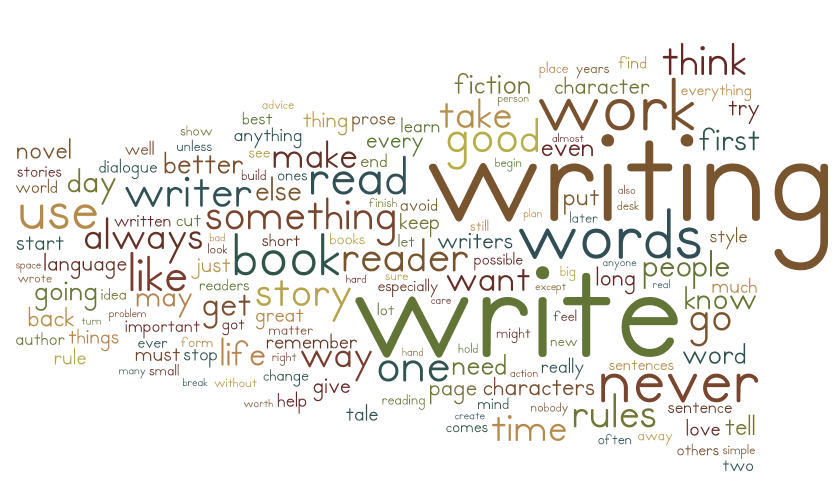Tips for writing good circulate the Internet like La Niña weather systems, or the flu. There’s a batch around the place now, most of these lists have been collated at The Guardian and at BigHow.com.

Image Credit: Wordle of the lists linked above
I’ve had a little look through the advice given, and these, by frequency, are the top ten tips from famous, and usually good, writers. Writers who often contradict each other. Which says something about the quality of such advice. Most of the advice is ridiculously obvious, but there’s nothing wrong with stating the obvious.
I do think there’s something in some of the tips being held in tension – like “just write” and “write to a meticulous plan” – one is more about honing your voice, the other is more about producing something with it. I also think there’s something in most of these for any communicator who uses words.
I tried to capture the essence of most of the advice given when I was collating these. And I’ve ordered this list by frequency, rather than in logical, or chronological, order. The numbers in brackets represent the number of times something came up.
-
Be Clear. Don’t overwrite.
Practice clarity of expression and thinking. Short words. The right words. Make adverbs, adjectives, and description functional, not ornamental, but mostly avoid them. Leave out bits people don’t want to read. Punctuate well. Carry dialogue with said. No frills. Clear sentences. Concrete thought. Edit harshly to achieve this. Make every sentence do something to a character, or for your plot. Write till the sentence/paragraph/page/book is its best, but it’ll never feel good enough. Good ideas often do away with bad. Be prepared to change things. Finish. (46)
-
Plan and be disciplined.
Avoid distractions like TV and the Internet. Schedule writing time. Writing is work. Keep going. Try to love it. Know we’re your work is going, go there. Nowhere else. Only include what is necessary. Know your structure and cover it with apt words and phrases. (42)
-
Edit Hard.
Write. Pause. Edit. Rewrite. Often. If it sounds like writing, rewrite it. Improve. Pull the trigger on the bad stuff (and cop it when someone else does). Edit at the end, or as you go, but edit well. Be self-critical, trust and care about your reader, don’t waste their time. (36)
-
Write from your heart.
Write about what you know and believe. What you have lived. What you imagine (probe the unknown). Think well. Write powerfully. Write truth. With compassion. Tell a story you care about. Write to engage (yourself first). Then persuade and transform. If it’s fiction – live your story. (33)
-
Just write.
Every day. Anywhere. Write lots. Don’t worry too much about plot or structure. Practice. Start anywhere. Get something down. As it happens. Keep writing. Stop mid sentence/idea and resume the next day knowing where you were going. Finish when you want to continue. (32)
-
Read widely.
Read good writing, including poetry. Immerse yourself. Observe structure, figure out how writing works and what works. Borrow good turns of phrase, vocab, etc. From anywhere. But make them yours and avoid cliché and jargon (and most similes and metaphors), bad writing is contagious. (31)
-
Figure out your style.
Read your work aloud. Think about rhythm and pace. Care about style. But use it to suit. Ignore rules if need be. Style is about getting you out of the way. Know and be aware of grammar but be prepared to break the rules. Think about your voice, be authentic. (30)
-
Capture inspiration.
Ideas and inspiration come from everywhere. Including your feelings. Go to places. Think with your senses. Life is a story. Carry a notebook. Keep a diary. (21)
-
Know your audience, and yourself.
Listen to people/readers you respect, but don’t care too much what other people think. The reader is your friend. But don’t write for them or for the “market.” (21)
-
Characterise well.
Characters should be necessary, and their necessity obvious. Introduce characters early. Think about psychology and motives. Make characters relatable, and appropriately likeable or unlikeable. Present them consistently so actions and words match character. Make them confront stuff. (17)